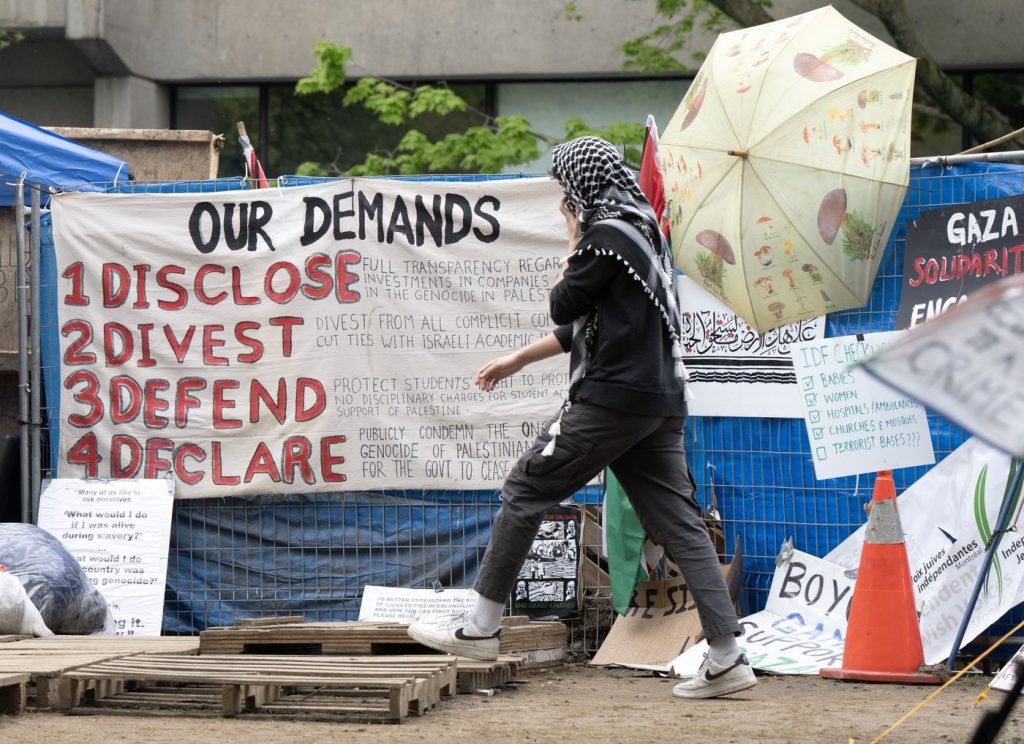Private property or public space? Encampments spark debate over campus status

MONTREAL — After four weeks that have featured torrential downpours, blistering heat and two failed legal bids to have them removed, pro-Palestinian protesters remain encamped on McGill University’s downtown campus.
Quebec Minister of Higher Education Pascale Déry said their continuing presence is an affront to the rule of law.
“These encampments have to be dismantled,” she told reporters this week in Quebec City. “It is not the appropriate place. Again, we are talking about private lands that are currently occupied.”
Advertisement
McGill, which last week failed in a bid for an injunction, has also labelled the encampment an illegal occupation of its property.
But as protesters angry over the mounting death toll in Gaza have erected tent cities on Canadian campuses in the past month, demanding that schools divest from Israeli companies and cut ties with Israeli universities, the legality of their actions remains a subject of debate.
Experts say the nature of a university means the answer is not as clear-cut as the minister and McGill suggest.
Constitutional lawyer and Université de Montréal instructor Frédéric Bérard says that while a campus belongs to a university, it shouldn’t be understood in the way a private residence belongs to an individual.
Bérard said in an interview this week that unlike a private residence a campus is a venue for engaging in debate, and the public’s right to access and use that space for free speech and peaceful assembly is enshrined in the Canadian Charter of Rights and Freedoms.
Advertisement
He said a court considering a challenge to an encampment has to decide if the right to free speech outweighs property rights, which in most cases it does.
Emmett Macfarlane, a professor of political science specializing in constitutional law at the University of Waterloo, said there is legal debate over whether universities, as private entities, are subject to the Charter.
But he said courts have in many cases applied the Charter to university actions affecting free expression.
“It may be true that university campuses have the legal status of private property, but I think there’s a broader principle here in that they are not like any other private space,” he said, comparing a campus to a public park and Parliament Hill. “They are public institutions and public universities, and the use of their space as part of a public forum for free expression is well established.”
He called the almost universal response of Canadian university administrators to seek the removal of protest encampments a failure to respect free expression and the right to peaceful assembly.
Advertisement
“Across North America, and yes, within Canada, they have been far too quick to demand that encampment(s) be removed,” Macfarlane said. “In almost all of the circumstances that we’re seeing, including at my own university at University of Waterloo, the encampments have indeed been peaceful.”
Protests are disruptive by definition, he added, but students and staff have not been prevented from attending class.
The University of Toronto issued a trespass notice against a campus pro-Palestinian encampment on Friday, vowing to take “all necessary legal steps” if protesters did not clear out by Monday morning.
American universities have seen clashes, and earlier this month Edmonton police dismantled a pro-Palestinian encampment on the University of Alberta’s campus. Students and academics there said police fired tear gas, and video posted to social media shows police striking students with batons, yet police denied using tear gas and said their use of force was limited.
“Almost all of the violence that we have seen in relation to these particular protests have not been the result of the protesters, but instead have been the result of police and universities moving to have the encampments removed or the protests ended,” Macfarlane said.
Advertisement
But that doesn’t mean the rights to free speech and assembly are without limits. Speech that is considered hateful is not protected. Neither is threatening the safety of others.
So far, Bérard noted, the courts have ruled against McGill’s claims that such behaviour was taking place on campus, even if the speech is considered controversial by some.
“Each and every encampment Is unique,” he said. “You cannot compare McGill to Université du Quebec à Montréal to University of Toronto or what’s happening in Edmonton. The court has to take into account the evidence that’s in front of it.”
Bérard said there is no hard limit to how long a campus can be occupied. He gave the example of the “Freedom Convoy” protests in Ottawa in 2022, saying that if they had happened on a university campus and had not blocked public access, they could theoretically have gone on indefinitely.
Macfarlane said the right to occupy a public space, like other Charter rights, is subject to limits, but universities need to show restraint as long as protests remain peaceful.
Advertisement
“The question is, what margin of appreciation do we as a society and as the law require for temporary disruptions of public space?” he said.
This report by The Canadian Press was first published May 25, 2024.
Joe Bongiorno, The Canadian Press